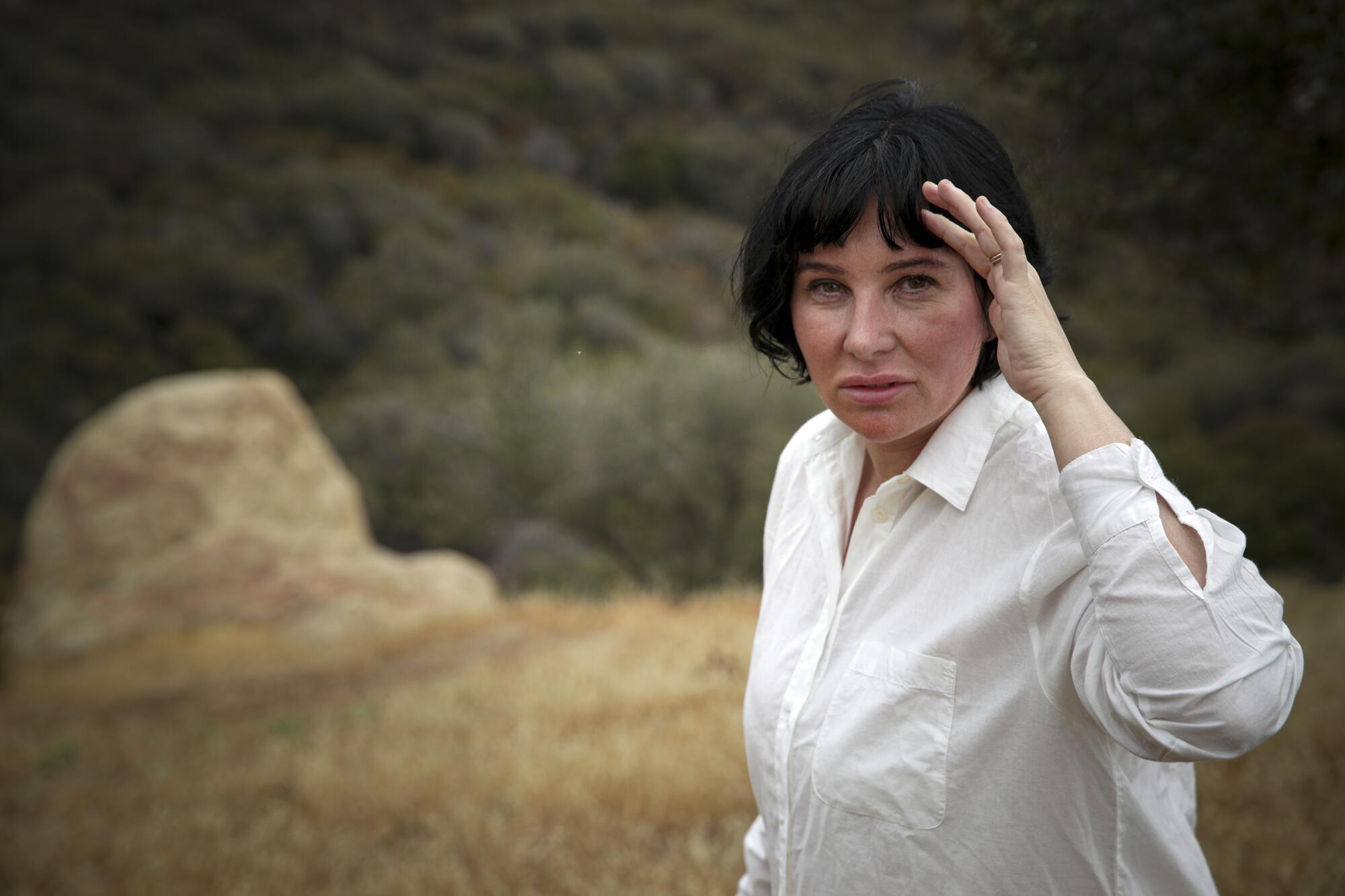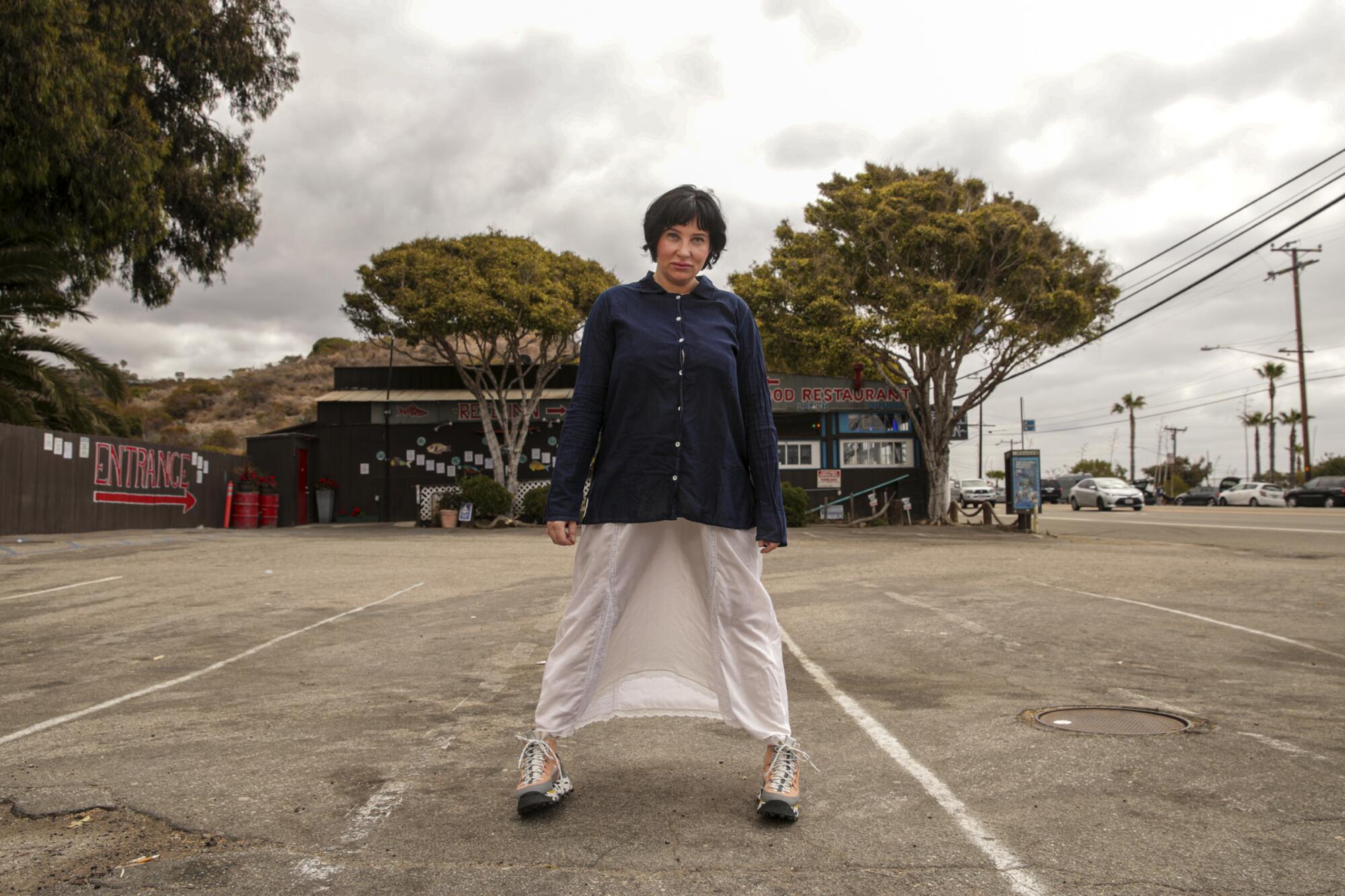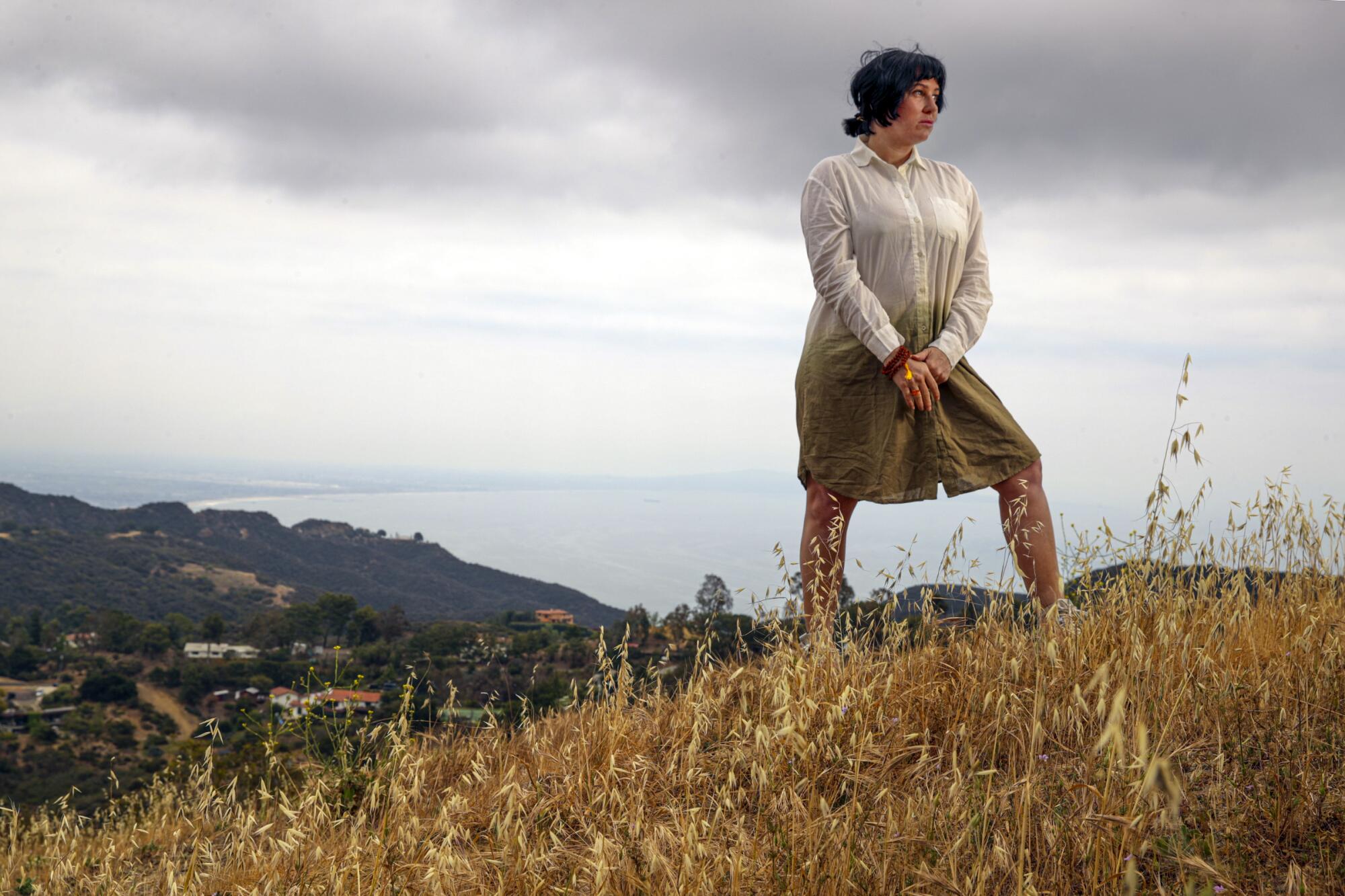
- Share via
On the Shelf
Animal
By Lisa Taddeo
Avid Reader: 336 pages, $28
If you buy books linked on our site, The Times may earn a commission from Bookshop.org, whose fees support independent bookstores.
There are so many things Lisa Taddeo wants to teach her daughter before she dies.
For most of her pregnancy, she thought she wouldn’t get that chance. When Fox, now 6, was inside her belly, doctors told Taddeo that she was unlikely to survive long past her due date. A scan had revealed something ominous-looking on her pancreas.
Miraculously, Taddeo ended up being fine. Still, who knew how long she’d have with Fox? After all, she’d lost her parents suddenly: her father in a car accident when she was 23, her mother five years later to lung cancer.
“Everything I do,” Taddeo says, “is so that if I leave my daughter too early — the way my parents did — I’ll leave her with enough. ... In a sense, every book is what I’ve learned — like, here’s what you should know about life that I won’t have been able to teach you.”
What she has to teach is not reassuring, but it is true, even when it’s fiction. In her new book, “Animal” — her first published novel — the narrator is also telling her daughter a story. Joan has uprooted her life in New York City after witnessing the brutal suicide of her married lover. Desperate for a new beginning, she drives across the country and settles in a sort-of commune in the hills of Topanga, where she and a few other lost souls rent shacks and yurts alongside the coyotes.
Taddeo lived in Topanga for seven months while she was writing “Three Women,” the 2019 nonfiction debut that made her famous. Exploring female sexuality through the lives of a high school student, a suburban mother and a middle-aged swinger, “Three Women” debuted at No. 1 on the New York Times bestseller list, establishing her as a preeminent immersive journalist.
Taddeo had spent the better part of a decade working on it — embedding with women in Manhattan Beach, Indiana and Martha’s Vineyard before settling on her primary subjects — and assuming no one would read it. The advance she’d earned from Avid Reader Press, albeit “decent,” lasted only so long, and at one point her husband, Jackson Waite, took a job snapping family portraits in the photo department at an Indiana Kmart. She couldn’t have made ends meet, she says now, without the money from the sale of her parents’ house.
She had also never thought of herself as a nonfiction writer. After graduating college, she sold a novel to a small imprint at age 23 but was so dissatisfied with the final product that she withdrew it from publication. In 2018, while finishing “Three Women,” she enrolled in Boston University’s MFA fiction program in the hopes that “everybody would take me more seriously.” Her thesis was “Animal,” which she submitted to Avid along with her final “Three Women” draft.
At 41, Taddeo says “Animal” finally shows the world who she really is as a writer. A propulsive literary thriller whose taut, knowing sentences ground the reader amid chaos, comes out June 8. Reviews have yet to hit, but a groundswell of support from high-profile figures is already building. Emma Roberts’ book club, Belletrist, selected it as a pick, and the actress recently voiced the audiobook version. Gillian Flynn, Chelsea Handler and Jojo Moyes have been early supporters, and “Sweetbitter” author Stephanie Danler has declared it even better than “Three Women.”
“I didn’t know what to expect from ‘Animal,’ but reading it, I had no peace, no rest — just a lump in my throat,” Danler says. “I was scared my kids were unsafe, that California was unsafe — it just stripped down all of the security in my life and poked holes in it. I think what Lisa does so well is that she makes you feel like you’re trespassing on the innermost vulnerabilities, fears and aspirations of women. It feels too close to home, in a lot of ways. ... It feels like she’s leapt off this cliff. How is she going to stick the landing?”
Off the page, Taddeo says she’s found it difficult to navigate her newfound success. She was in L.A. when a publicist from Avid called to tell her “Three Women” was No. 1. Two days later, the rights to the book were optioned.
All she remembers is the panic she felt at the prospect that it would force her out into the world more. She lives with her family in a rural part of Litchfield County, Conn., and fantasizes about writing short stories in the Cotswolds and teaching at the University of Bath. Which could be mistaken for the prototypical writerly dream if the anxiety weren’t so palpably seeping out of Taddeo’s pores.
“I have not enjoyed anything. Literally,” she says, reflecting on her post-”Three Women” popularity and laughing to leaven the sentiment. “I mean, I am happy. I love my husband and my daughter. I’ll have moments of, like, ‘Oh, cool! I did this,’ or ‘The book is done!’ But then immediately I feel like the end of the world is nigh.”

Taddeo is sitting out back at the Reel Inn, a seafood restaurant on the side of Pacific Coast Highway that features in “Animal.” In the book, Joan describes its “patio with heat lamps and pebbles on the ground and picnic tables and petunias in galvanized Corona buckets.” That’s exactly where the author is now, eating a shrimp Caesar salad that has been delivered without any shrimp, though she doesn’t correct the error.
She decided to set “Animal” in Topanga because it felt like the most gothic place she’d ever been. It was so hot, and she’d always pass people walking their dogs with pet crows on their shoulders. She liked the idea of living in some dreamy spot above the clouds, but in reality the place just made her feel unmoored.
She was in town for only a few days this month but ended up spending most of her time working on scripts for a Showtime television version of “Three Women,” which she hopes will start shooting this fall. In the show, Taddeo will feature more prominently — a fourth woman, essentially. She says screenwriting hasn’t come naturally to her: “I can write 3,000 words of prose in, like, 20 minutes. Because I’m crazy, not because I’m talented. But an hour script will sometimes take me a week or two.”
That’s not exactly the way Laura Eason, the “Three Women” showrunner, sees it.
“I have to say, I’m a little bit mad at her. It’s like, could you actually be a little less good at this?” Eason says. “She’s an incredibly lauded writer but hadn’t done a ton of screenwriting. I have more experience than her, but she wrote the book. The potential for this to be a disaster was high, but we’ve ended up in this profoundly deep collaboration.”
After “Animal” is released, Taddeo is set to publish a collection of short stories. And a few weeks ago, she sold her fourth book, a reported memoir on grief.
She doesn’t think writing about her fears will exorcise them, immediately rejecting the notion of writing as catharsis. She’s simply choosing, she says, to write about the thing she can’t stop thinking about. Yet a part of her also believes her ability to stare into the face of darkness was essential to getting her “Three Women” subjects to talk.
“I was in a black hole of pain, and it’s just easier for people to relate to that,” she says. “There’s people who don’t want to hear about dark stuff — it ruins their day. But I have always felt like we all walk around with so much pain, and it sucks to not be able to talk about it.”
Taddeo considers “Animal” a “compendium of all of the pain bodies” she came into contact with in the course of working on “Three Women.” But it’s also, in a way, the story of her own struggle — of a woman whose chaotic life has left her “stripped of her niceties.”
“When my parents died, it utterly reconstructed me as a human being,” she says. “It turned me into an animal, in a sense. And not an animal that kills, but a scared, skittering mouse that is constantly driving from one place to another to try to hide from her brain.”

Taddeo has tried to reckon with her anxiety in myriad ways. Her biggest struggle is with hypochondria, which manifested after her mother’s death. One psychiatrist told her she had the worst case of obsessive-compulsive disorder he’d ever encountered. She’s tried talk therapy plenty of times but doesn’t really feel that it works. For a while, she was on lamotrigine — an anticonvulsant meant to stop her spiraling thoughts. But it fatigued her, which made her think she had cancer. So she switched to Prozac, which she currently supplements with Xanax and marijuana.
“That sort of mania is also what helps me write,” she acknowledges. “My brain doesn’t stop moving, so work is the only thing that helps to get it out.”
What she worries about most is Fox. While packing for a recent vacation, Taddeo noticed a black mark on Fox’s nose. When it didn’t rub off, she started spiraling: Was it cancer? A tick? She pulled out a pair of tweezers and began trying to remove the spot.
“And it ended up being a f— Sharpie. One of my Sharpies, and I made my daughter’s nose bleed to try to take something out,” she says.
She has dozens of stories like this. There was another cancer scare — a bruise on Fox’s stomach that the pediatrician relieved with some rubbing alcohol. On another occasion, Fox was throwing a tantrum in the back seat of the car and threw popcorn into Taddeo’s eyes. She angrily pulled over.
“I turn around and I’m like, ‘Do you know how my father died? He got into a car accident!’ ... And then it’s over and I’m like, ‘Oh my God, what are you doing? You can’t do that.’ And I freak out.”
She’ll also frequently “faux kidnap” Fox, running up from behind her and scooping her up if she’s too far ahead, to show her how easily she could be taken by a stranger.
Growing up, Taddeo wasn’t certain she wanted to have children. Her own mother, who emigrated from Italy to New Jersey, often told her she “wouldn’t be a good mom.”
But then she met Waite and he wanted to try for a kid. It was a spur of the moment decision, Taddeo says. The couple were living in a RV at the time because Taddeo was reporting “Three Women.” One night, after she had been pregnant for two months, she started to bleed. It lasted for 24 hours and she miscarried. She never went to the hospital; she was too scared to go and find out she might be dying.
Getting pregnant had made her feel she “finally had something to live for at long last,” she says. “[Before], I felt like I was in so much pain and so sad all the time that if something happened, whatever.”
She paused, trying to steer the conversation to a lighter place.
“I mean, listen: I like hanging out. I like going to dinner. I like seeing people,” she insists. But the moment she starts “feeling love overflowing,” she cuts off the emotion, shifting subconsciously into the anxious part of her brain that equates happiness with risk.
She’s trying to be more present. Like a few weeks ago, when Fox asked her to have a pillow fight. Taddeo agreed but had never had one before, so she took to Google: “How do you have a pillow fight?” Later that day, while watching television, she realized the idea had sprung from a TV commercial in which a mother and daughter were mid-pillow toss, laughing heartily.
“It was so heartbreaking.” she says. “Instead of being present and having pillow fights, I’m like, ‘Here. I’m gonna write all of this s—. Just so that you have it.’”
More to Read
Sign up for our Book Club newsletter
Get the latest news, events and more from the Los Angeles Times Book Club, and help us get L.A. reading and talking.
You may occasionally receive promotional content from the Los Angeles Times.








